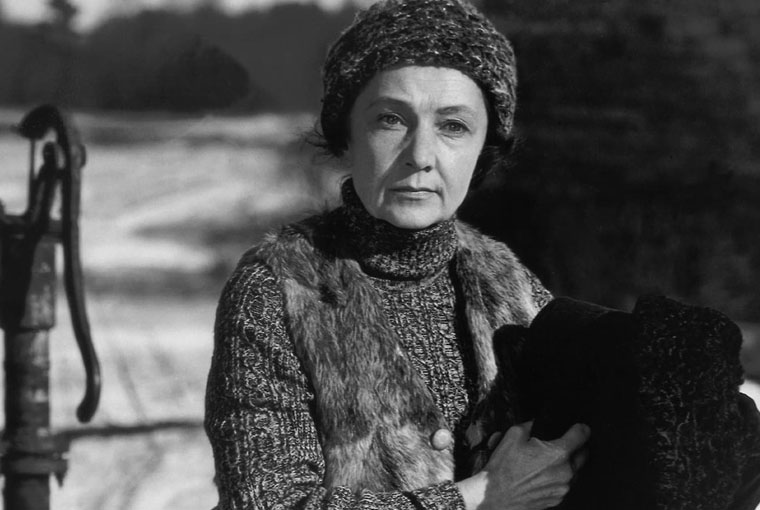Turning Hot and Cold
Arvo Kruusement’s A Woman Heats the Sauna (Naine kütab sauna, 1979)
Vol. 151 (January 2025) by Zoe Aiano
Faithful to its title, the Estonian feature film A Woman Heats the Sauna tells the story of a woman heating a sauna. However, the Socialist Realist straightforward descriptiveness belies a nuanced, humanist tale of crisis and endurance.
Anu (Ita Ever) is a single mother in her forties working in a factory in Tallinn who leads a seemingly unostentatious life when she is singled out for a “special” task. The company is hosting a group of foreign visitors and plans to regale them with a trip to the corporate sauna, located in a small village to which Anu happens to have a connection, namely Aita (Katrin Välbe), her ex-husband’s elderly aunt. She is therefore given the dubious honor of going ahead to make the preparations.
After battling her way to the sauna hut through a blizzard, she somewhat reluctantly goes to pay her respects to Aunt Aita – after all, they’re no longer technically related. Despite Anu’s hesitations, Aita greets her with a hearty, grateful welcome, only to then promptly die later that night. Now, in addition to her sauna-heating duties, Anu is also left in charge of the funeral arrangements and the wake, and this at a time when, as both the ambulance paramedic and Aita point out, the ground is too hard to bury anyone. While the title of the film alludes to the personal turmoil and struggle that can exist behind an apparently simple act, that of the Villem Gross novel on which it was based, namely “Winter Holiday,” seems instead to be a sarcastic nod to the female character’s double burden of work and caregiving – there’s no rest for the new Soviet woman.
Part of what makes such an undramatic tale so compelling is the charisma of the protagonist, which is in turn due to both the actress, who manages to be equally convincing when being both playful and practical, sassy and sensitive, and the director, who gives her the opportunity to show this range, going against the standard portrayal of a blue collar divorcee as “downtrodden.” Despite her lowly social status, the other female characters in particular treat her with reverence and respect, acknowledging her competence and caring nature.
Indeed, this is also mutual, as Anu and Aunt Aita each praise the other’s stoicism and endurance. Even the Russian translator Olya (Svetlana Orlova), who stands out as urbane and stylish, therefore making her a prime candidate for shallowness, extends solidarity to Anu, encouraging her to prioritize her own needs over those of her feckless bosses and literally taking her out of the kitchen to put her on the same level as the others. The only disappointingly predictable female archetype is the mother-in-law, bitter, possessive, and hysterical as she is.
In contrast to this, the male characters span a broad spectrum of incompetence and self-interest, divided between those who make crass passes at Anu at inappropriate times and those who belittle her by bossing her around and not allowing her to speak for herself. Within the over-arching critique of the current social order, the patriarchy is shown in a particularly deprecating light. Olya’s defense of Anu against her bosses poignantly highlights how pathetic it is of them to harangue her for the sake of their petty ambitions. Anu’s ex-husband also seems incapable of self-sufficiency, having replaced the care given by his wife by that of his aging mother and apparently not contributing to his daughter’s upbringing at all.
In terms of the filmmaking style, at times there’s an almost ethnographic level of detail – in the way the beds are made with five layers of blankets to protect against the harsh weather, in the attention to lighting and keeping fires, in the preparation and consumption of food. Giving this space over to the mundanity of daily life helps to flesh out the humanity of the story – we feel the characters’ hunger, cold, tiredness, frustration, and fear in a very tangible way.
Ultimately, the film is a snap-shot of a societal shift in action. Aunt Aita represents a form of rural lifestyle that seems destined to die out with her. The only way to stop her farm from falling into the hands of the local politicians is to pass it on to Anu’s daughter Katrin (Tene Ruubel), an eventuality that seems highly unlikely given that Katrin doesn’t even make the effort to come to the funeral. The whole younger generation is apparently only interested in partying and defying authority. The tone of the film manages to avoid excessive moralizing, however. Of course there is a sense of loss as the villages lose their inhabitants and identity, but clearly nobody feels strongly enough to do anything about it and it all seems fairly inevitable. Socialist society is depicted as dysfunctional and petty, but capitalist society is shallow and exploitative, and the message, in so far as there is one, seems to be that life goes on until it doesn’t and in the meantime we’ll all manage somehow. When faced with the cold, we find warmth in mutual support and not in the elitist sauna.




Leave a Comment